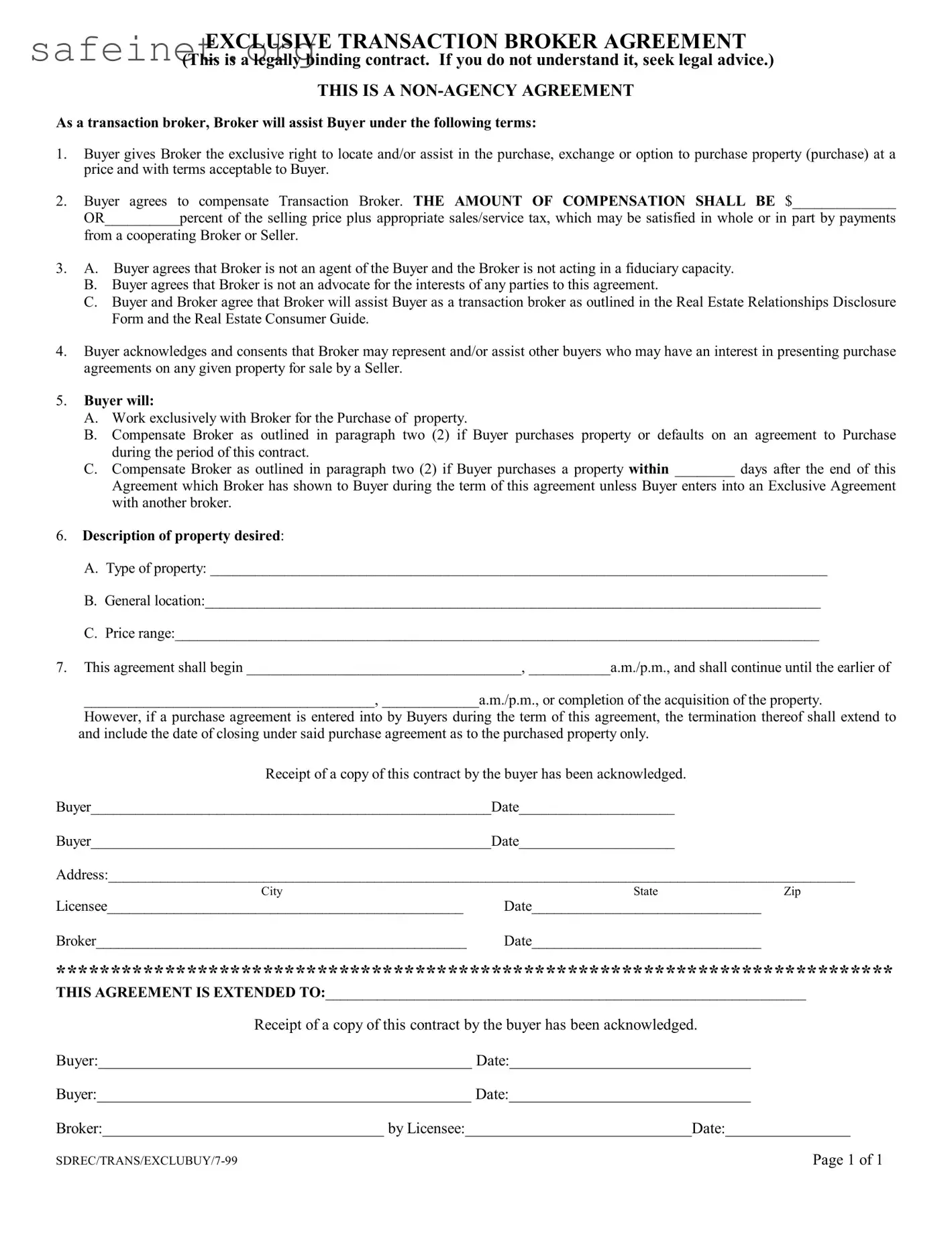EXCLUSIVE TRANSACTION BROKER AGREEMENT
(This is a legally binding contract. If you do not understand it, seek legal advice.)
THIS IS A NON-AGENCY AGREEMENT
As a transaction broker, Broker will assist Buyer under the following terms:
1.Buyer gives Broker the exclusive right to locate and/or assist in the purchase, exchange or option to purchase property (purchase) at a price and with terms acceptable to Buyer.
2.Buyer agrees to compensate Transaction Broker. THE AMOUNT OF COMPENSATION SHALL BE $______________
OR__________percent of the selling price plus appropriate sales/service tax, which may be satisfied in whole or in part by payments from a cooperating Broker or Seller.
3.A. Buyer agrees that Broker is not an agent of the Buyer and the Broker is not acting in a fiduciary capacity.
B.Buyer agrees that Broker is not an advocate for the interests of any parties to this agreement.
C.Buyer and Broker agree that Broker will assist Buyer as a transaction broker as outlined in the Real Estate Relationships Disclosure Form and the Real Estate Consumer Guide.
4.Buyer acknowledges and consents that Broker may represent and/or assist other buyers who may have an interest in presenting purchase agreements on any given property for sale by a Seller.
5.Buyer will:
A.Work exclusively with Broker for the Purchase of property.
B.Compensate Broker as outlined in paragraph two (2) if Buyer purchases property or defaults on an agreement to Purchase during the period of this contract.
C.Compensate Broker as outlined in paragraph two (2) if Buyer purchases a property within ________ days after the end of this Agreement which Broker has shown to Buyer during the term of this agreement unless Buyer enters into an Exclusive Agreement with another broker.
6.Description of property desired:
A.Type of property: ___________________________________________________________________________________
B.General location:___________________________________________________________________________________
C.Price range:_______________________________________________________________________________________
7.This agreement shall begin _____________________________________, ___________a.m./p.m., and shall continue until the earlier of
_______________________________________, _____________a.m./p.m., or completion of the acquisition of the property.
However, if a purchase agreement is entered into by Buyers during the term of this agreement, the termination thereof shall extend to and include the date of closing under said purchase agreement as to the purchased property only.
Receipt of a copy of this contract by the buyer has been acknowledged.
Buyer______________________________________________________Date_____________________
Buyer______________________________________________________Date_____________________
Address:_____________________________________________________________________________________________________
City |
State |
Zip |
Licensee________________________________________________ |
Date_______________________________ |
|
Broker__________________________________________________ |
Date_______________________________ |
|
*****************************************************************************
THIS AGREEMENT IS EXTENDED TO:_________________________________________________________________
Receipt of a copy of this contract by the buyer has been acknowledged.
Buyer:________________________________________________ Date:_______________________________
Buyer:________________________________________________ Date:_______________________________
Broker:____________________________________ by Licensee:_____________________________Date:________________
SDREC/TRANS/EXCLUBUY/7-99 |
Page 1 of 1 |
